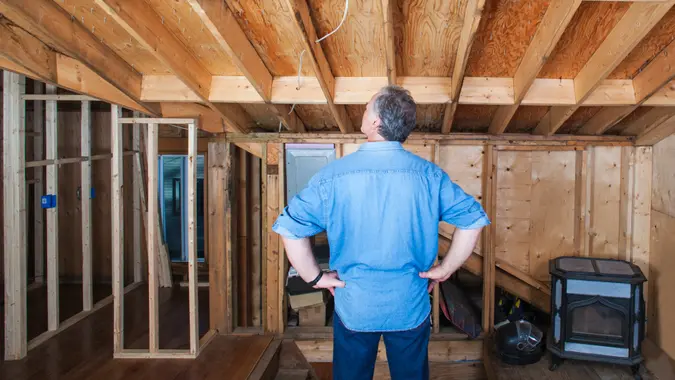Moving vs. Adding an Addition: Experts Explain Which Option Is Better for You Financially

Commitment to Our Readers
GOBankingRates' editorial team is committed to bringing you unbiased reviews and information. We use data-driven methodologies to evaluate financial products and services - our reviews and ratings are not influenced by advertisers. You can read more about our editorial guidelines and our products and services review methodology.

20 Years
Helping You Live Richer

Reviewed
by Experts

Trusted by
Millions of Readers
It’s a scenario familiar to so many homeowners: they have reached a point where their current house feels like it no longer fits their needs.
That’s when they usually face a major choice — move or add on. While moving can be costly, so can beefing up a current home. According to Angi, a home addition costs an average of $51,042.
If you’re thinking about the best use of your money to have a bigger home, here’s what some experts told GOBankingRates they’d consider when choosing between moving and getting an addition.
Financial Rules of Thumb
From a financial perspective, Shanli Liu, founder of FreedomFolio, said she always runs some quick calculations.
“Most additions recoup about 50-70% of their cost in home value, but overbuilding for your neighborhood can actually hurt resale potential,” Liu said. “I tell clients that adding 20-30% more space usually hits the sweet spot.”
Liu said moving can give more value if your current home is small for the market, but transaction costs, inspection, agent commissions and upgrades can eat up potential gains. Liu also factors in property taxes, mortgage differences and long-term ROI. Per Liu, breaking it down this way helps clients see which option truly makes sense for their pocketbooks.
A Few Easy Tests
According to Ryan Fitzgerald, owner of Raleigh Realty, a few simple tests help most families decide.
“If your wish list is mostly about location, schools or yard, moving is the honest answer,” Fitzgerald said. “If your wish list is mostly about how the house works day to day, an addition is usually the smarter spend.
Further, per Fitzgerald, if you can fix your pain with a kitchen expansion and one more living or sleeping space, stay and build. If you need to rework most of the house to be happy, look for a new address.
The Best Balance
At the end of the day, according to Eric Bramlett, owner of Bramlett Partners, this decision is about balancing your money with your peace of mind.
“Look at the market, understand your financial position and think carefully about how you want to live for the next five to ten years,” Bramlett said. “A personalized review with someone who knows the local trends can show you which path makes the most sense – and save you from costly guesswork.”
 Written by
Written by  Edited by
Edited by 

























